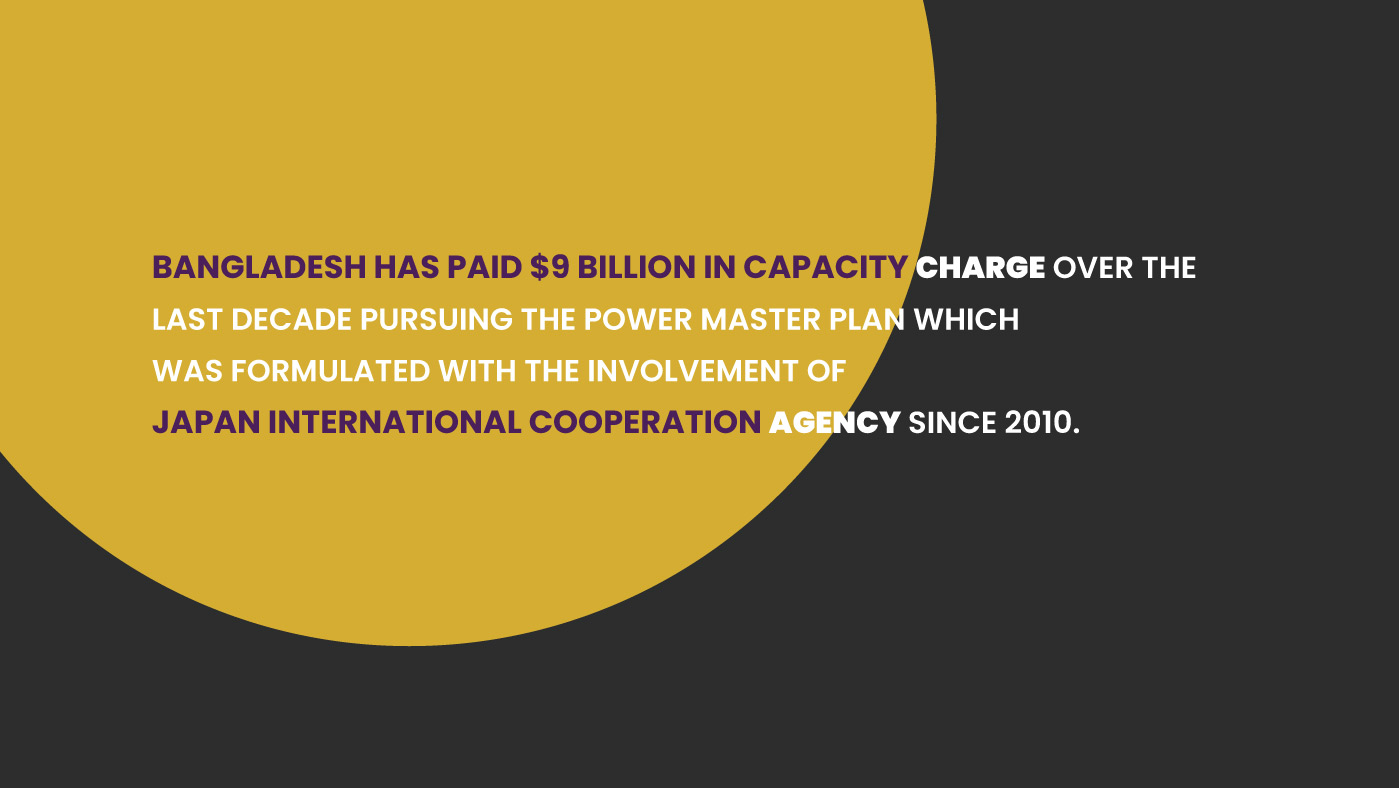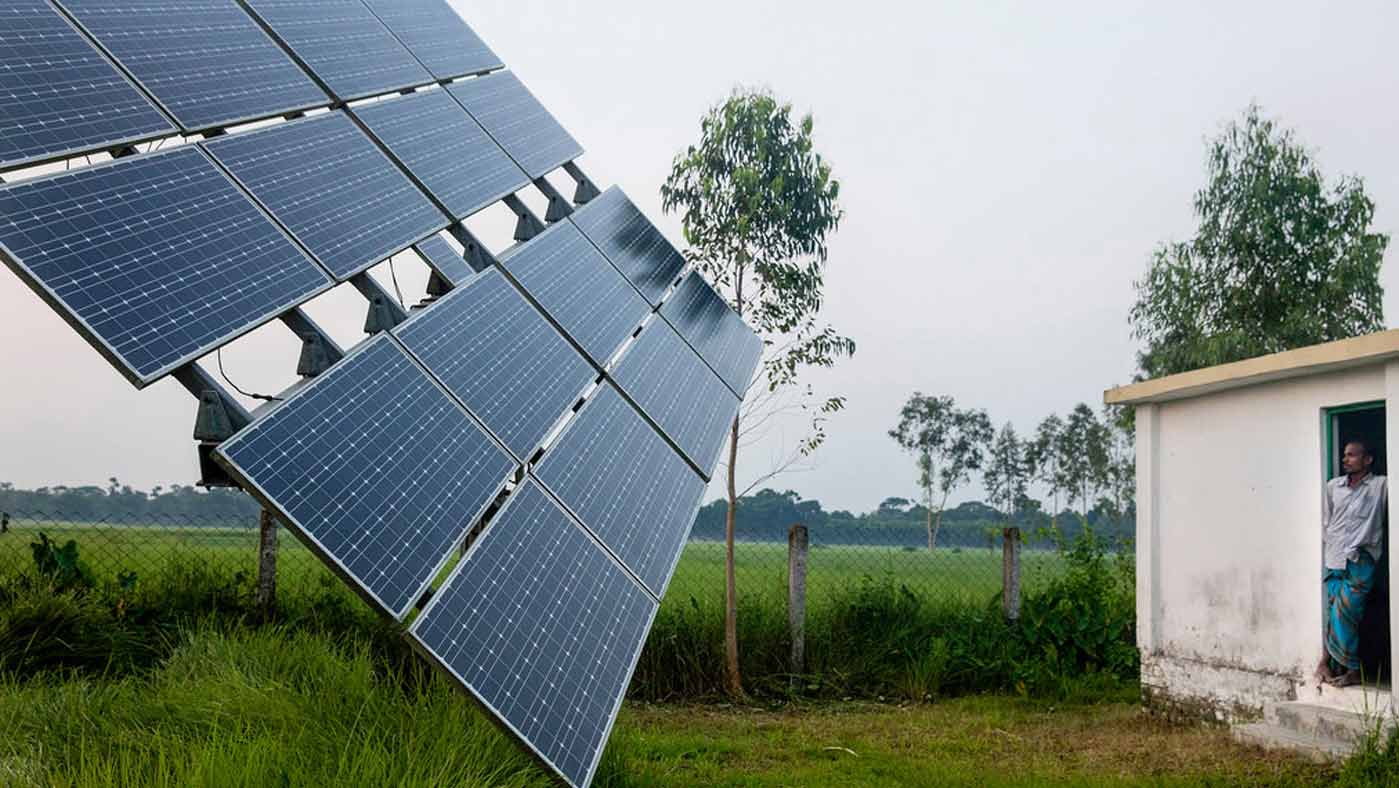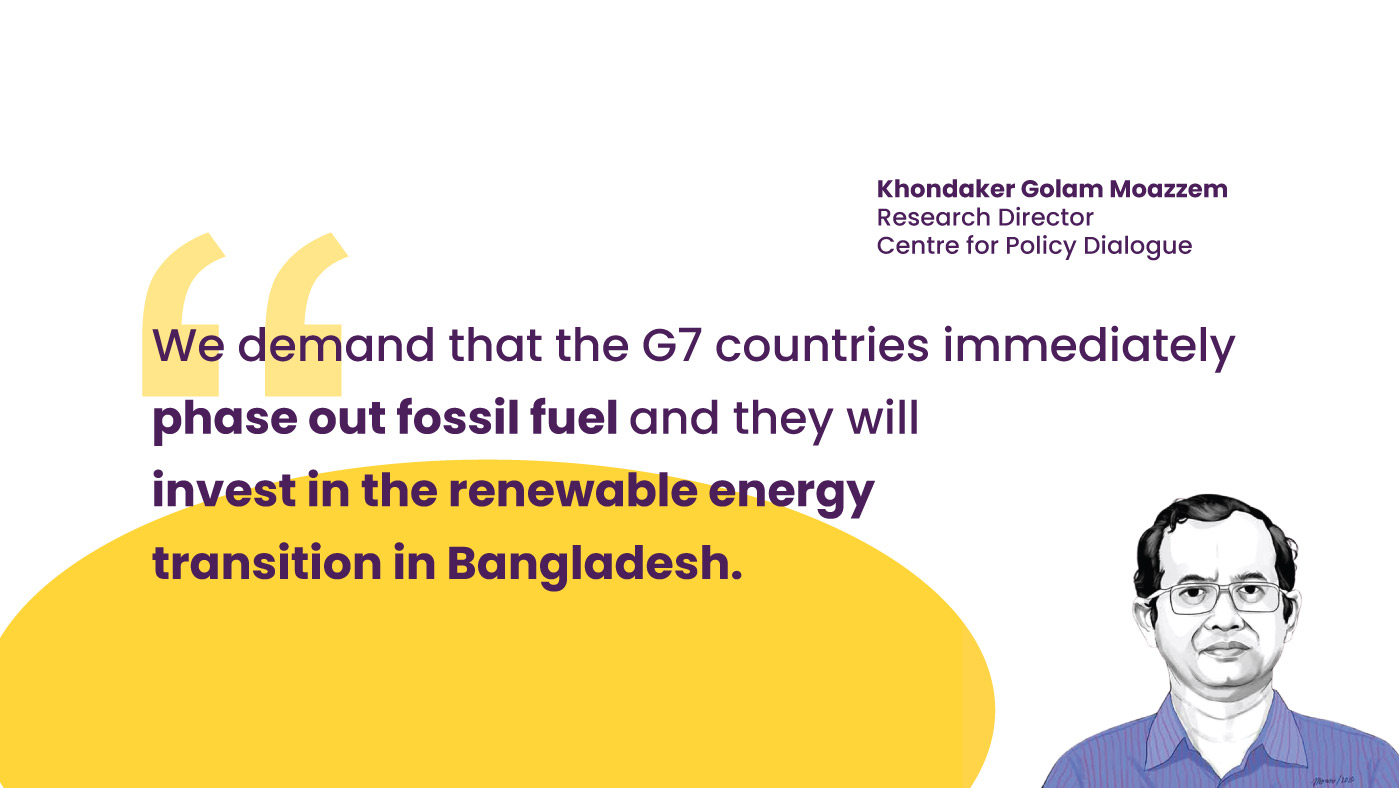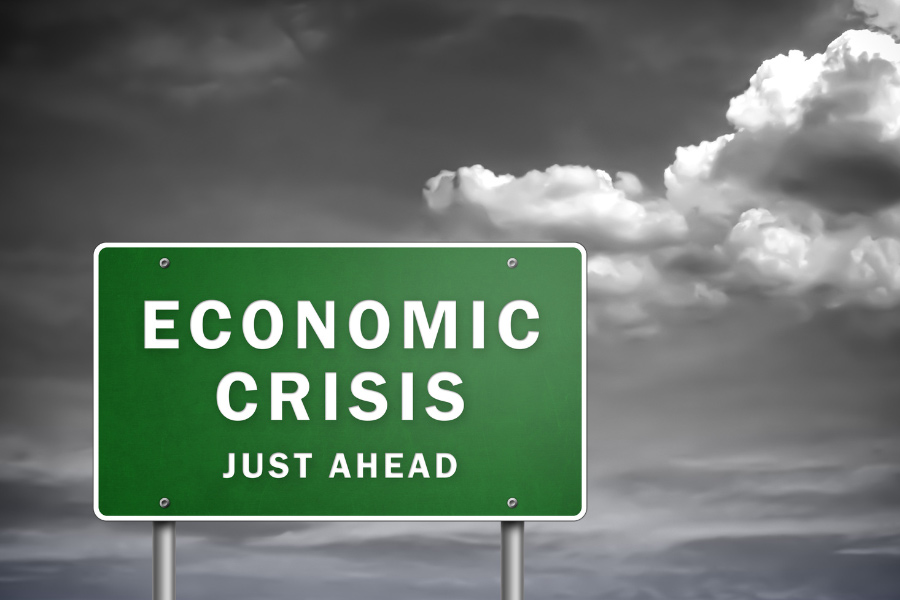G7 countries urged to phase out fossil fuel, invest in renewable energy transition
The three-day-long 49th summit of the Group of Seven or G7 countries that ended in Japan on May 21 gave energy experts and economists at home and abroad an occasion to shed light on how the developed world locked Bangladesh into imported fossil fuel until 2050 or even beyond.
In international energy conferences and individual interviews, the experts cited Bangladesh as an example of how G7 member states helped expand fossil fuel in the country before renewing their calls on the G7 countries to phase out fossil fuel and invest in renewable energy transitions.
Despite agreeing on the need of taking urgent and ambitious actions for dealing with the challenges of climate change, the G7 countries – Canada, France, Germany, Italy, Japan, the United Kingdom and the United States – contributed far less than they should to the Green Climate Fund and does not even have a deadline for phasing out fossil fuel, the experts said.
As for Bangladesh, with half of its massive fossil-fuel-based installed capacity unused, generating a huge amount of capacity charge, the country is currently grappling with a severe dollar crisis and also the worst inflation in over a decade.
In an attempt to deal with the inflation, Bangladesh has increased energy prices frequently over the last two years, including four times this year, and is also accepting a loan of $4.7 billion from the International Monetary Fund.
Bangladesh Working Group on External Debt, a non-government organisation, in a policy brief recently said that Bangladesh annually spends around Tk 40,000 crore from foreign currency reserves to import LNG and Tk 25,000 crore to import coal. Besides, Tk 23,000 crore is needed in FY 2022-23 for paying capacity charges.
Bangladesh has paid $9 billion in capacity charge over the last decade pursuing the power master plan which was formulated with the involvement of Japan International Cooperation Agency since 2010. Countries like Japan, the UK, and the USA have made financial or technological contributions in increasing Bangladesh’s fossil fuel capacity almost five times since 2009.
‘We demand that the G7 countries immediately phase out fossil fuel,” said Khondaker Golam Moazzem, research director, Centre for Policy Dialogue, an independent think-tank, which recently released a policy brief on the G7 summit.

Still burning coal, the G7 countries emitted more than 8 billion tonnes of carbon dioxide in 2021, accounting for 22 per cent of the global carbon dioxide emissions of over 37 billion tonnes, according to Our World in Data, a UK-based online publication providing data on burning global problems.
In 2021, the USA alone emitted more than 5 billion tonnes of carbon dioxide while Japan emitted more than one billion tons. The global annual emissions of carbon dioxide before 1950 stood at 6 billion tonnes.
The contribution of the USA and European Union in global warming is so much that some civil society groups held them morally responsible for bearing more than half the cost needed for mitigating threats from changing climate.
‘We also hope G7 countries will invest in the renewable energy transition in countries like Bangladesh,’ he said.
The G7 countries, the world’s top emitters of greenhouse gasses, continued patronizing the expansion of fossil fuels such as coal and liquified natural gas in many ways in parts of the world where fossil fuel consumption is low, locking countries like Bangladesh in the use of costly energy beyond 2050.
Energy expert Mohammad Tamim said that the G7 countries must give countries like Bangladesh commercial and economic advantages to ensure their continued economic development. ‘Bangladesh could use some technological and financial assistance,’ he said.
In the past, G7 countries promised to stop supporting fossil fuels and promote renewable energy. But the promises were not translated into action.
National and international civil society members who recently attended energy conferences in Bangladesh accused the G7 countries of locking Bangladesh in costly fossil fuels, leaving the country in a state of energy and food insecurity, exposed to many shocks.
Between 2009 and 2023, Bangladesh signed agreements for 160 power projects worth 30,898MW with 97 per cent of it depending on fossil fuels, including about a third of the fossil fuel capacity depending on coal, according to Bangladesh Power Development Board. A total of 129 of the signed power projects worth 19,164MW materialised by April 2023 with 98 per cent of the electricity coming from fossil fuels.
The new power projects took Bangladesh’s overall installed power capacity to 24,143MW but the contribution of renewable energy in the energy mix rather dropped over the period of their implementation – from 2.18 per cent in 2010 to 1.73 per cent in 2021, according to Our World in Data.

In 2021, compared with 2009, the share of gas in primary energy consumed reduced to 68 per cent from 76 per cent and the share of oil in primary energy consumed increased to 23 per cent from 17 per cent while the share of coal increased to 8 per cent from 6 per cent, according to Our World in Data.
Japan International Cooperation Agency played a key role in preparing the power and energy policy that Bangladesh followed for building its massive capacity of current power generation, following a five-fold increase in the 2009 capacity, in the pursuit of rapid economic growth.
Built mostly on energy import, the supply of which is guaranteed by the state, the power and energy sector also allowed private investors guaranteed profit in the form of capacity charge – payment legally payable whether or not power is produced or energy infrastructures used. The call for exploration of own gas was largely overlooked in the power and energy policies.
‘The inevitable result of relying overwhelmingly on imports is it can lead to energy shortages under many circumstances such as a dollar crisis or global political instability,’ said energy expert Badrul Imam.
Over the last two years, Bangladesh encountered all of these circumstances, more or less, often simultaneously, getting caught in a persistent overcapacity problem that kept growing and transferred $9 billion in capacity charge from public to private pockets.
Bangladesh also has a yearly debt obligation of $2 billion from mega power projects. Despite spending so much, Bangladesh saw no respite from load shedding, which, in fact, kept breaking records at the peak of summer as severe heat waves swept vast stretches of the country for weeks with record temperatures, exposing public health to heat-related illnesses.
Both life and businesses suffered immensely as the energy crisis worsened inflation with the government frequently rining energy bills – four times in the first quarter of this year.
Reports revealed that electricity prices at the bulk level increased by 183 per cent and at the consumer level by 111 per cent since the incumbent government assumed power in 2009. Over the last one and a half years power production increased by nearly 75 per cent, at the same time.
‘It has been quite a while since factories were affected by energy shortage,’ said RMG exporter Mahmud Group general manager Sudhangshu Kumar Dutta. ‘Everybody’s livelihoods would be at risk if the situation does not improve,’ he said.
Owners of exporting factories said many of their assets became stranded because of the energy crisis, pushing up their production costs and threatening to bring their businesses down. The export-oriented factories represent the most privileged industries in terms of gas supply. The extent of power and gas crises is unimaginable in local industries, industrialists said.
Household consumers, on the other hand, continued paying piped gas though they received only a little of what was promised. On occasions, the piped gas flow dropped to just zero.
Consumers Association of Bangladesh’s vice president SM Nazer Hossain said that the recent gas crisis triggered by cyclone Mocha caused nearly 6 lakh households in Chattogram to spend Tk 4,000 extra in three days after May 12. ‘Frequent power cuts also damage electrical appliances,’ said Nazer. ‘Summer load shedding also increased people’s medical costs amidst the worst inflation in decades,’ he said.
Villages and the underprivileged experienced load-shedding more frequently than cities for authorities distributed power to the privileged class first to avoid enraging them.
Though authorities initially, after officially introducing power cuts in July last year, tried to maintain a schedule the move collapsed within months as the difference between the demand and supply greatly widened.
‘Severe energy crisis clearly gave rise to a discriminatory system in the power sector,’ said Moazzem.

The situation is going to get even worse for the next power sector master plan, named Integrated Energy and Power Master Plan, talks about an energy mix that energy experts said would perpetuate fossil fuel dependency until 2050 and beyond. The IEPMP, being prepared with the involvement of JICA, promotes fossil fuel as clean technology, energy experts observed at an international conference held in the capital Dhaka titled Bangladesh Energy Prosperity 2050.
Instead of outlining a clear renewable energy transition roadmap, the IEPMP promises to generate 40 per cent of electricity needed in 2041 from clean energy, which is actually an attempt at continuing fossil fuel use, said Yuki Tanabe, program director, Japan Center for Sustainable Environment and Society, in an email.
The IEPMP tries to sell hydrogen energy as carbon neutral without mentioning its high likelihood of increasing methane concentration in the atmosphere, the experts said, adding that the technology would further increase power production costs. Calling carbon capture technology underperforming, energy experts also noted that ammonia co-firing could reduce carbon dioxide emission by a fifth in the best-case scenario but at the cost of doubling expenses.
Compared with renewables, whose cost is falling by 10 per cent annually, the new technologies would further lock Bangladesh in high expenses, energy experts warned, reminding that fossil-based power generation cost increased by 12 per cent annually.
But Bangladesh seems to have an elaborated plan of pursuing fossil fuel for sometime more with the next IEPMP promoting imported LNG use. An estimate by Australia-based Market Forces said Bangladesh has plans for setting up 37 new gas power plants worth 32GW based on imported LNG.
‘There seems to be no escape from the existing situation,’ said economist MM Akash. ‘Power price will inevitably go further up as the government chooses costly electricity over cheaper renewable options while slashing subsidies,’ he said.





